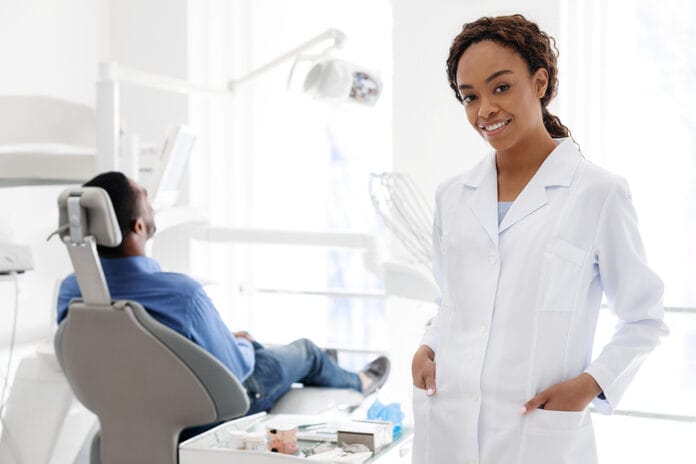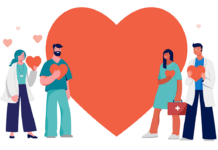Professionalism is the way a person represents themselves or the business they own or work for. Professionalism is defined as a professional character, spirit, or methods ‒ the standing or practice of a professional as distinguished from an amateur.1
A professional is also defined as relating to a job that requires special education, training, or skill; done or given by a person who works in a particular profession; and paid to participate in a sport or activity.2 So, these descriptions fit for dentistry. We are dental professionals and should exuberate professionalism to a high standard.
Granted, being treated with respect, kindness, and professionalism for the result of a valuable experience is basic and common. Professionalism is civility, competency, dependability, respectability, and proficiency.
Casual is Not Professional
For example, I received a recent text reminder for a doctor’s appointment, and it addressed me as “Hey James” and ended with “thanks.” In my opinion, this is not professional and too casual for a professional entity. First, if my last name is going to be used, I expect “Ms. James” or just simply refer to me by my first name. “Hey” is not a professional greeting. A “good morning,” “afternoon,” or “hello,” but not “hey.” As it used to be said, “hay is for horses,” and I am not a horse. This casualness has me wondering about the laxity with other professional conduct in the clinic.
“Thanks” is more informal than a “thank you.” So, I already have my impressions of how this place is run, and I prefer my health not to be taken lightly. I know I sound like an old fuddy-duddy, but there is a difference between casualness of friends versus a paid professional service and advice that can alter my life.
Appearance is Not Always Deceiving
Appearance can determine a person’s perception of another person or entity. Having clean and well-kept clothes is important. Scrubs are cleaned on a regular basis, and the constant washing fades the colors, wearing the material down and causing a ragged appearance after a while. Also, having the scrubs wrinkle-free and not looking like they were just taken out of the laundry hamper improves credibility. Another addition is making sure scrubs are free of pet hair.
For the front office, a dress code is a professional trait ‒ clean, appropriate (nothing hanging out), fitting clothing on the employee. A former coworker of mine was stationed at the front desk. The attire often included low-cut blouses. As with most front desks, the patients walk up to the counter and stand while personnel sits on a lower level. When patients approached the counter and looked down towards my former coworker, shall I say more than a greeting was displayed. Some patients loved it, and some complained about it. Being neutral with outfits is more professional in a dental setting. Honestly, cleavage shouldn’t be part of an experience in the dental field.
Negative Remarks about Coworkers
I have experienced coworkers verbally fighting with each other, making snide remarks in front of patients, and blaming others in the workplace. The workplace environment should be professional and competent.
Everyone won’t get along all the time, but keep it behind closed doors. We all have flaws, but our patients shouldn’t know that. How would you feel if you overheard a coworker complaining to a patient about how awful you were, either from a personal perspective or a professional perspective? Honestly, what is the purpose and what comes out of disparaging coworkers? It only makes you look horrible.
When a patient comments negatively about coworkers, don’t agree. If it’s positive feedback, absolutely agree.
Cleanliness Shines
Dust and grime pile up quickly. Keeping the dental office clean promotes the perception that cleanliness is valued. Since we work in a sanitary, sterilized environment, there should be a high standard of hygiene. A dental office is a public place, so it should be cleaned daily or often throughout the week.
Some offices have cleaning personnel, and the personnel is the cleaners in other offices. In the latter case, it can be challenging to find the motivation and time to clean. Getting into a routine is helpful for wiping down operatory chairs, including the base and extensions. A regular cleaning includes the arms of the x-ray machine, all cords, counters, faucets, sinks, floors, baseboards, and blinds. Don’t forget the light cover of the light, which is positioned directly over the patient, giving them an obvious place to notice any dirty spots. Make sure the ceilings and lights are clean and free of cobwebs as the patient looks straight up there during the cleaning.
The bathrooms are another important room. Many patients and all employees use the bathroom daily. It should all be cleaned. The whole toilet, including the flusher handle, sinks including faucets, soap dispensers, air freshener container, a handicap bar, anything a person touches after going to the bathroom and before washing their hands. Don’t forget to include the doorknobs on both sides of the door and light switches.
Keep toilet paper, soap, and paper towels stocked, emptying the trash can daily. I personally view a full trash can in the morning as a red flag. It’s either laziness or lack of concern for cleanliness; neither one is a professional appearance.
Clean floors by mopping or vacuuming. Finger smudges appear everywhere; clean front office counters, plexiglass barriers (that were recommended with the pandemic), glass doors, and handles. Keeping pictures clear of dust and cobwebs maintains a professional appearance.
There’s a lot with cleanliness. As I mentioned at the start of this section, the dental office is a public place, so cleaning chairs in the waiting room and operatory is important. People sit everywhere. Wherever they sit during the day accumulates on their clothing and gets spread around. Making sure all chairs are cleaned should be essential. Even if the germs or dirt can’t be seen, it’s there.
Please note that the above does not mean that a dental hygienist should be scrubbing toilets unless that is an agreed-upon part of working at that particular office. What is mentioned is an overview of cleanliness within a dental office.
I understand my own quirks, but I believe if a service is being paid for (especially if it’s expensive as dentistry has become), the environment should appear and feel five-star. Since the patient pays our paycheck, it is a professional relationship and not a causal relationship.
Honesty in Communication
Be honest. If you don’t know something, as we can’t know everything, tell the patient you’re not familiar with that topic but will look into it. And then look into it. Trying to misrepresent something is ingenuine, and most patients can pick up on that. Then it can lead to what else are we not fully honest and genuine with?
Answer all of the patients’ questions to the best of your ability or direct them to the right person to ask. I personally prefer to deal with minimal people as being passed around to different people for an answer makes it seem like no one really knows anything. For example, if a patient has a question about the cost of a nightguard, I will personally ask the front office. If they are not at their desk, I will find them and personally get the cost to tell the patient rather than passively send the patient up front to ask (for a second time) on their own. The patient shouldn’t have to talk to multiple people for a resolution. It’s exhausting and can be perceived the patient is unimportant.
Just Polite Conversation, Please
Certain conversations in the workplace should be avoided with both coworkers and patients. If you know you’re not on the same page with someone or it’s controversial, keep it out of the workplace.
I learned this when I was younger and a new hygienist. A patient had a certain political view and kept talking politics. She asked who I was voting for, and I actually told her (who was not who she was voting for). Honestly, I was just starting to pay attention to politics but was very naïve and dumb about it.
Well, I never saw her again ‒ whether it was a coincidence or because she had strong political views, and mine were the complete opposite. I learned quickly not to have those conversations. I still get patients who throw out words to see where I stand, and I stay as neutral as I can with any conversational subject.
Another example was when I worked for a dentist who was going through a nasty divorce. He had been practicing for about 15 years at that time and had shared many conversations with patients over the years. During the divorce, he was disclosing many personal issues, known as TMI, too much information. It’s easy to feel like some patients are friends since we’ve known them for many years. After he left the room, those patients commented that they felt really uncomfortable about him talking about his detailed personal life. While he thought they were friends on that level, they didn’t feel the same.
Exposing too much personal information could lead a patient to believe the dental professional isn’t in their right frame of mind to work, especially if there are many issues disclosed.
To be safe, keep things professional.
Need CE? Click Here to Check Out the Self-Study CE Courses from Today’s RDH!
Listen to the Today’s RDH Dental Hygiene Podcast Below:
References
- (n.d.). Dictionary.com. Retrieved from https://www.dictionary.com/browse/professionalism
- (2021, December 1). Merriam-Webster. Retrieved from https://www.merriam-webster.com/dictionary/professional#h1
- (2021, November 28). Merriam-Webster. Retrieved from https://www.merriam-webster.com/dictionary/casual











